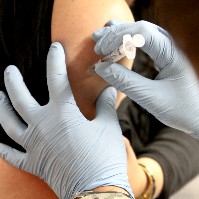Infectious Disease Research Institute (IDRI) in Seattle and Medicago Inc. in Quebec City, Canada say the U.S. Food and Drug Administration approved their request to start a clinical trial of a vaccine for the H5N1 avian flu. The early stage — phase 1 — trial will test the safety and ability to generate an immune response from their vaccine that includes a booster made by IDRI called a GLA adjuvant.
According to the Centers for Disease Control and Prevention, the influenza A (H5N1) is a deadly virus that occurs mainly in birds including domestic poultry. Sporadic human infections with the H5N1 virus have occurred and caused serious illness and death. A stockpile of a vaccine is being developed to combat H5N1 that reduces the amount of vaccine needed per person and can be easily administered.
The vaccine tested in the clinical trial will include a Glucopyranosyl Lipid A (GLA) adjuvant that in animal tests has been able to extend the antibodies in an H5N1 vaccine to other potential pandemic influenza strains. The adjuvant is also expect to boost the potency of the vaccine and thus reduce the amount of vaccine needed per individual.
Medicago produces vaccines with what it calls virus-like particles that need only the genetic sequence of the virus not an actual virus sample required by current vaccine processes. The particles are made of protein shells overlayed with small pieces of the proteins relevant to controlling the target disease. In addition, the particles are made to look like a virus, which lets them be recognized by the body’s immune system, but they do not have the core genetic material, making them non-infectious and unable to replicate.
The phase 1 trial is scheduled to begin in September 2012 and enroll 100 healthy adults at three locations in the U.S. The trial, funded by the Defense Advanced Research Projects Agency, is expected to take 15 months, with first safety and immunology data expected in the first quarter of 2013.
The trial will also test an intradermal method of vaccine delivery, using a microneedle system made by NanoPass Technologies in Israel. Trial subjects will be divided between the microneedle and traditional intramuscular (syringe) delivery method.
Darrick Carter, vice president of IDRI’s Adjuvant Technology program says the trial is believed to be the first test of an intradermal adjuvant, and could result in a self-administered vaccine in case of a pandemic. “Our idea is to ultimately produce a one-dose vaccine that you could give yourself,” says Carter. “Imagine a flu vaccine that you can easily administer using a simple, painless microneedle device arriving in your mailbox.”
Read more:
- Vaccine Developer Awarded Countermeasures Center Contract
- Biotech, Pharma Companies to Collaborate on New Vaccines
- Clinical Trial Underway for Seasonal/H1N1 Vaccine
- Research Suggests Strategy for Stockpiled Avian Flu Vaccine
* * *


 RSS - Posts
RSS - Posts
[…] FDA Approves Clinical Trial for H5N1 Vaccine […]
[…] FDA Approves Clinical Trial for H5N1 Vaccine […]